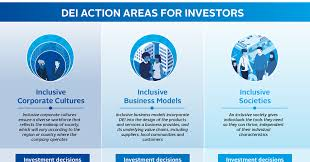Q. What specific actions can be taken to ensure that job evaluation processes and outcomes promote diversity, equity, and inclusion (DEI) goals?
Ensuring Job Evaluation Processes and Outcomes Promote
Diversity, Equity, and Inclusion (DEI) Goals
Job evaluation is a systematic process used to
determine the relative worth of different jobs within an organization. It is a
crucial component of compensation management, as it provides the basis for
establishing fair and equitable pay structures. However, traditional job
evaluation methods have been criticized for perpetuating biases and
inequalities, particularly concerning diversity, equity, and inclusion (DEI).
To ensure that job evaluation processes and outcomes promote DEI goals, organizations
must adopt a comprehensive and proactive approach that addresses potential
biases and incorporates inclusive practices throughout the entire process.
The first step in promoting DEI through job evaluation
is to critically review and revise existing systems. This involves examining
the factors used to evaluate jobs, the weighting assigned to these factors, and
the overall structure of the system. Organizations should identify and
eliminate any factors that may perpetuate biases or undervalue the work
performed by women, people of color, or other underrepresented groups. For
example, factors that emphasize physical strength or traditional notions of
leadership may disadvantage certain groups.
2. Incorporate DEI Considerations
into Job Descriptions:
Job descriptions are the foundation of the job
evaluation process, as they define the duties, responsibilities, and required
skills for each position. To promote DEI, organizations should ensure that job
descriptions are written in inclusive language and avoid gendered or biased
terms. They should also clearly articulate the essential functions of the job
and the knowledge, skills, and abilities required to perform them successfully.
This clarity helps to ensure that all qualified candidates, regardless of their
background, are considered for the position.
3. Establish Diverse Job
Evaluation Committees:
Job evaluation committees play a critical role in
determining the relative worth of different jobs. To promote DEI, organizations
should establish diverse committees that include representatives from different
departments, levels, and demographic groups. This diversity of perspectives can
help to identify and mitigate potential biases in the evaluation process.
Additionally, committee members should receive training on DEI principles and
unconscious bias to ensure they are equipped to make fair and objective
evaluations.
4. Use Multiple Job
Evaluation Methods:
Traditional job evaluation methods, such as point
factor and ranking systems, can be limited in their ability to capture the full
value of different jobs. To promote DEI, organizations should consider using
multiple methods, including qualitative approaches that focus on the skills,
knowledge, and experience required for successful job performance. This can
help to ensure that jobs that are traditionally held by women or people of
color, such as those in caregiving or social services, are properly valued.
5. Conduct Regular Pay
Equity Audits:
Pay equity audits
are essential for identifying and addressing any gender or race-based pay gaps
within an organization. These audits should be conducted regularly to ensure
that pay structures remain fair and equitable over time. If pay gaps are
identified, organizations should take steps to correct them, such as adjusting
salaries or providing additional training and development opportunities.
6. Communicate Job
Evaluation Processes and Outcomes Transparently:
Transparency is
crucial for building trust and ensuring that job evaluation processes are
perceived as fair and equitable. Organizations should communicate their job
evaluation methods, criteria, and outcomes clearly and openly to all employees.
This includes providing access to job descriptions, evaluation criteria, and
salary ranges. Additionally, organizations should establish a process for
employees to appeal job evaluations if they believe they are unfair or
inaccurate.
7. Provide Training and
Development Opportunities:
To promote DEI in
the workplace, organizations should provide training and development
opportunities to all employees, particularly those from underrepresented
groups. This can help to ensure that all employees have the skills and
knowledge necessary to advance their careers and reach their full potential.
Additionally, organizations should support mentorship and sponsorship programs
that connect employees from underrepresented groups with senior leaders who can
provide guidance and support.
8. Foster an Inclusive Workplace Culture:
Ultimately,
promoting DEI through job evaluation requires a broader commitment to fostering
an inclusive workplace culture. This includes creating a workplace where all
employees feel valued, respected, and supported, regardless of their
background. Organizations should implement policies and practices that promote
diversity, equity, and inclusion in all aspects of employment, from hiring and
promotion to performance management and compensation.
9. Monitor and Evaluate DEI
Outcomes:
To ensure that job
evaluation processes and outcomes are promoting DEI goals, organizations should
monitor and evaluate their progress regularly. This includes tracking metrics
such as the representation of women and people of color in different job
categories and salary levels. Additionally, organizations should solicit
feedback from employees to identify any areas where further improvement is
needed.
10. Continuously Improve Job
Evaluation Practices:
Promoting DEI
through job evaluation is an ongoing process that requires continuous
improvement. Organizations should regularly review and update their job
evaluation systems and practices to ensure they remain aligned with DEI goals.
This includes staying informed about best practices in job evaluation and DEI
and incorporating them into their own processes.
By taking these specific actions, organizations can
ensure that job evaluation processes and outcomes promote DEI goals and
contribute to a more equitable and inclusive workplace. This not only benefits
individual employees but also strengthens the organization as a whole by
fostering a diverse and talented workforce.








0 comments:
Note: Only a member of this blog may post a comment.